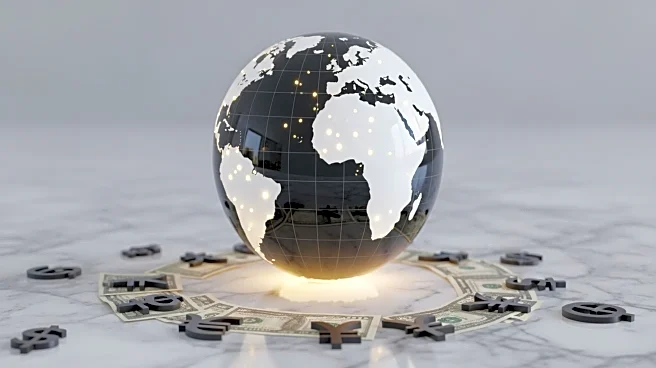What's Happening?
The New Development Bank (NDB), established by BRICS nations, has expanded its membership by welcoming Bangladesh, the United Arab Emirates, Uruguay, and Egypt. This expansion, occurring during the COVID-19
pandemic, marks the first addition of new members since the bank's inception. The NDB, created to provide an alternative to traditional multilateral development banks, aims to finance sustainable development and infrastructure projects. The inclusion of these new members highlights the NDB's growing influence in the global financial architecture, as it seeks to differentiate itself from established institutions like the World Bank and IMF. The bank's governance structure, which emphasizes equal financial contributions and decision-making power among members, sets it apart from legacy MDBs.
Why It's Important?
The expansion of the NDB's membership underscores the increasing multipolarity in global finance, as countries seek alternatives to Western-led financial institutions. The NDB's focus on sustainable development and infrastructure projects aligns with the priorities of its new members, who are looking to enhance their economic growth and development. By joining the NDB, these countries gain access to concessionary financing and support for projects that may not align with the conditionalities of traditional MDBs. The NDB's unique governance structure, which promotes equal voice and contribution among members, may serve as a model for more inclusive and equitable global financial institutions.
What's Next?
As the NDB continues to expand its membership, it may face challenges in balancing the diverse interests of its members while maintaining its commitment to sustainable development. The bank's strategic outreach and partnership-building efforts will be crucial in navigating geopolitical tensions and enhancing its global profile. The NDB's focus on using local currencies and supporting green bonds may further differentiate it from traditional MDBs, potentially attracting more countries seeking innovative financing solutions. The bank's ability to scale up its operations and compete with other multilateral lenders will be key to its success in the coming years.
Beyond the Headlines
The NDB's expansion reflects a broader shift towards Southern-led development agendas, as countries in the Global South seek greater representation in global economic governance. The bank's emphasis on sustainability and inclusive growth aligns with the priorities of its new members, who are looking to address climate change and promote renewable energy. As the NDB enters its second decade, it may need to enhance its research capabilities and policy influence to sustain its developmental push and advance a Southern-led agenda. The bank's unique governance norms, which promote consensus and equal contribution, may serve as a model for more democratic and inclusive global institutions.











